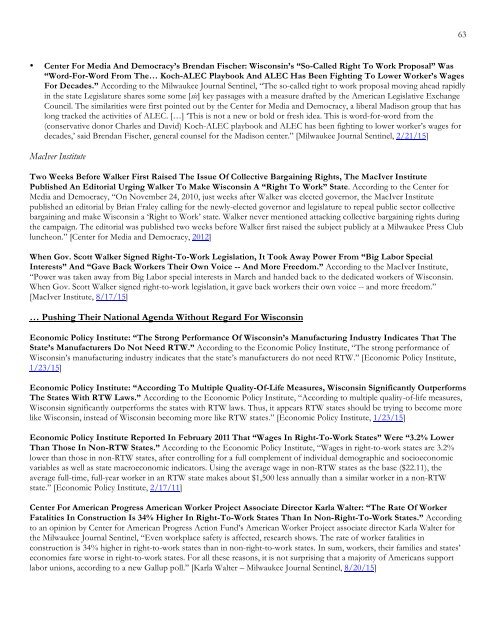Wisconsin-Report
Wisconsin-Report
Wisconsin-Report
You also want an ePaper? Increase the reach of your titles
YUMPU automatically turns print PDFs into web optimized ePapers that Google loves.
63<br />
• Center For Media And Democracy’s Brendan Fischer: <strong>Wisconsin</strong>’s “So-Called Right To Work Proposal” Was<br />
“Word-For-Word From The… Koch-ALEC Playbook And ALEC Has Been Fighting To Lower Worker’s Wages<br />
For Decades.” According to the Milwaukee Journal Sentinel, “The so-called right to work proposal moving ahead rapidly<br />
in the state Legislature shares some some [sic] key passages with a measure drafted by the American Legislative Exchange<br />
Council. The similarities were first pointed out by the Center for Media and Democracy, a liberal Madison group that has<br />
long tracked the activities of ALEC. […] ‘This is not a new or bold or fresh idea. This is word-for-word from the<br />
(conservative donor Charles and David) Koch-ALEC playbook and ALEC has been fighting to lower worker’s wages for<br />
decades,’ said Brendan Fischer, general counsel for the Madison center.” [Milwaukee Journal Sentinel, 2/21/15]<br />
MacIver Institute<br />
Two Weeks Before Walker First Raised The Issue Of Collective Bargaining Rights, The MacIver Institute<br />
Published An Editorial Urging Walker To Make <strong>Wisconsin</strong> A “Right To Work” State. According to the Center for<br />
Media and Democracy, “On November 24, 2010, just weeks after Walker was elected governor, the MacIver Institute<br />
published an editorial by Brian Fraley calling for the newly-elected governor and legislature to repeal public sector collective<br />
bargaining and make <strong>Wisconsin</strong> a ‘Right to Work’ state. Walker never mentioned attacking collective bargaining rights during<br />
the campaign. The editorial was published two weeks before Walker first raised the subject publicly at a Milwaukee Press Club<br />
luncheon.” [Center for Media and Democracy, 2012]<br />
When Gov. Scott Walker Signed Right-To-Work Legislation, It Took Away Power From “Big Labor Special<br />
Interests” And “Gave Back Workers Their Own Voice -- And More Freedom.” According to the MacIver Institute,<br />
“Power was taken away from Big Labor special interests in March and handed back to the dedicated workers of <strong>Wisconsin</strong>.<br />
When Gov. Scott Walker signed right-to-work legislation, it gave back workers their own voice -- and more freedom.”<br />
[MacIver Institute, 8/17/15]<br />
… Pushing Their National Agenda Without Regard For <strong>Wisconsin</strong><br />
Economic Policy Institute: “The Strong Performance Of <strong>Wisconsin</strong>’s Manufacturing Industry Indicates That The<br />
State’s Manufacturers Do Not Need RTW.” According to the Economic Policy Institute, “The strong performance of<br />
<strong>Wisconsin</strong>’s manufacturing industry indicates that the state’s manufacturers do not need RTW.” [Economic Policy Institute,<br />
1/23/15]<br />
Economic Policy Institute: “According To Multiple Quality-Of-Life Measures, <strong>Wisconsin</strong> Significantly Outperforms<br />
The States With RTW Laws.” According to the Economic Policy Institute, “According to multiple quality-of-life measures,<br />
<strong>Wisconsin</strong> significantly outperforms the states with RTW laws. Thus, it appears RTW states should be trying to become more<br />
like <strong>Wisconsin</strong>, instead of <strong>Wisconsin</strong> becoming more like RTW states.” [Economic Policy Institute, 1/23/15]<br />
Economic Policy Institute <strong>Report</strong>ed In February 2011 That “Wages In Right-To-Work States” Were “3.2% Lower<br />
Than Those In Non-RTW States.” According to the Economic Policy Institute, “Wages in right-to-work states are 3.2%<br />
lower than those in non-RTW states, after controlling for a full complement of individual demographic and socioeconomic<br />
variables as well as state macroeconomic indicators. Using the average wage in non-RTW states as the base ($22.11), the<br />
average full-time, full-year worker in an RTW state makes about $1,500 less annually than a similar worker in a non-RTW<br />
state.” [Economic Policy Institute, 2/17/11]<br />
Center For American Progress American Worker Project Associate Director Karla Walter: “The Rate Of Worker<br />
Fatalities In Construction Is 34% Higher In Right-To-Work States Than In Non-Right-To-Work States.” According<br />
to an opinion by Center for American Progress Action Fund’s American Worker Project associate director Karla Walter for<br />
the Milwaukee Journal Sentinel, “Even workplace safety is affected, research shows. The rate of worker fatalities in<br />
construction is 34% higher in right-to-work states than in non-right-to-work states. In sum, workers, their families and states’<br />
economies fare worse in right-to-work states. For all these reasons, it is not surprising that a majority of Americans support<br />
labor unions, according to a new Gallup poll.” [Karla Walter – Milwaukee Journal Sentinel, 8/20/15]


